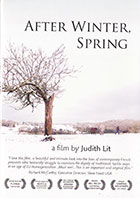
After Winter, Spring 2013
Distributed by Bullfrog Films, PO Box 149, Oley, PA 19547; 800-543-FROG (3764)
Produced by Judith Lit, Terra Productions
Directed by Judith Lit
DVD , color, 74 min.
High School - General Adult
Documentaries, Agriculture, Ecology, France, Food, Globalization, Sustainable living, Business, Economics
Date Entered: 07/20/2015
Reviewed by Irina Stanishevskaya, University of Alabama at Birmingham LibrariesThe producer, director, and narrator of this documentary, Judith Lit, moved to the Périgord region of South West France more than 15 years ago. It is there that she became a witness to the struggles of the local family farmers who often refer to themselves as peasants (people of the land) in the modern industrial agricultural world. Exploring the question, “Will this be the last generation of family farmers in a region continuously cultivated for over five thousand years?”, Judith spent more than three years recording and visually presenting the farmers’ way of work and life.
Having grown up on a family’s farm in Pennsylvania and understanding the differences in daily activities during the seasons of the farming year, she organized the documentary into the four phases: spring, summer, autumn, and winter. During each phase, she introduces the audience to the daily operations of the local farms through the individual stories of Nanou Bouchat, Isabelle & Frédéric Coté, Guy Phélip, Alain Rabeau, Alfred Tripied, Oliver & Dylan Veyret, and the women of Brusquand: Isabelle & Charlotte Brajot, Ginette Delibie, and Marie-Louise Gourdon. For instance, she introduced 60-year-old Guy Phélip, a once promising student at the local school. Despite the wishes of his teacher to continue his education, Guy decided to become a farmer. For more than forty years, he has operated a small farm based on polycultural farming principles, which allow flexibility and diversification. In order to survive, he has worked with animals, tobacco, walnuts, pastures, corn, and wheat. Everything brings an income for livelihood. His wife, Rose, works outside the farm as a school teacher, and his son, Samuel, loves the countryside but has no desire to continue farming. Guy says his son, “… wants a little more freedom, a little more vacation, to be a little less confined by our work,” but this makes him “… afraid that there won’t be any more farmers in Petit Salignac.”
There have been a lot of rapid changes related to small-scale farming. Farmers have been confronted with the demand of large investments, technical and economical adjustments in farm operations, bureaucracy, and many modifications in EU regulations. The message of the farmers’ voices is clear: it is getting more and more difficult to be a small farmer. For instance, 84-years-old Marie-Louise, cannot afford to retire because she still has to help her daughter and granddaughters to run the Brusquand Farm.
Judith’s neighbors have always shared with her the beauty of peasant life and the natural way of living. “Don’t take from nature more than you need,”- tells her closest neighbor Mr. Gonzales. Her father, Nate Golub, taught her the same thing when she helped him on the farm in Pennsylvania. However, their farm didn’t survive the competition with the large-scale farms and had to be sold. Judith says, “As a child, I didn’t realize that what was happening on our farm was happening all over America. In the next 50 years, more than a million acres of Pennsylvania farmland were lost.”
Each story presented is unique but all of them have many things in common: despite the hardships and worries of small-scale farming, the farmers are proud of their identity and pleased with their professions, they enjoy working and making healthy products, promoting environmentally friendly agricultural methods and practices, paying attention to ecology, loving the earth and living in balance with nature, and passing on the knowledge and lifestyle values across generations. The title of the film expresses optimism - after winter always comes spring, which symbolizes a time of phenomenal renewal and beginning of new life. The filmmaker ends the film with a hope that small family farms will survive and find a sustainable niche in modern agricultural production.
This documentary is an honest and realistic contribution to public awareness of the major issues related to small-scale farming. The author didn’t find any solutions to those issues but visually documented and collected the opinions and voices of the local farmers, which can be used to bolster discussions in subjects related to sustainable agriculture, business, globalization, small-scale farming, and preservation of local identity.
The film is appropriate for public and academic library collections. The narration of the film is in English, and interviews and stories are in French with English subtitles. The video quality is excellent and the cinematography is skillfully done by Stéphane Carbon.
Awards
- Best Foreign Documentary, Arizona International Film Festival
- Audience Award, Mill Valley Film Festival
- Jury Award, Caméras Des Champs